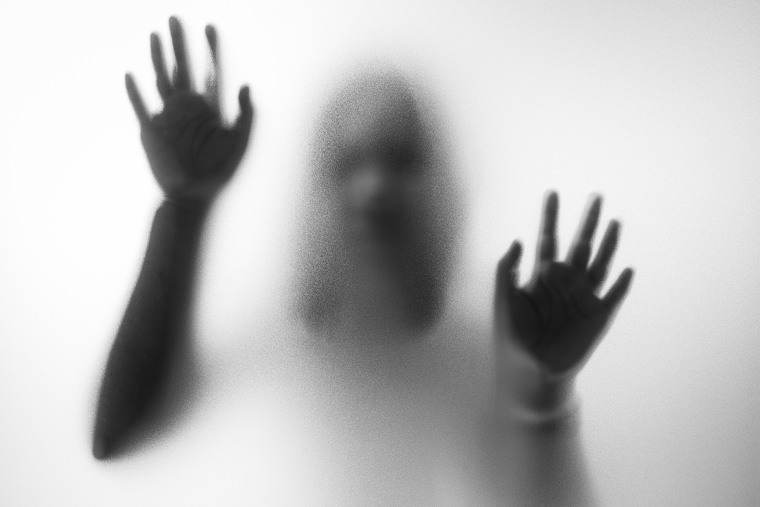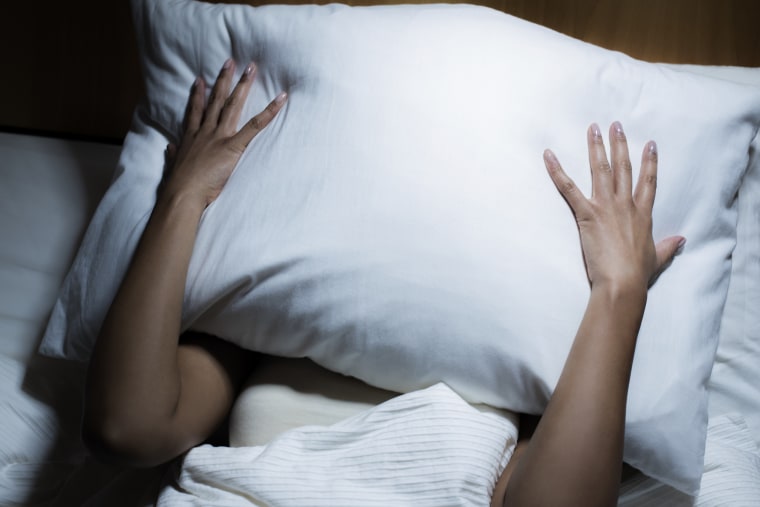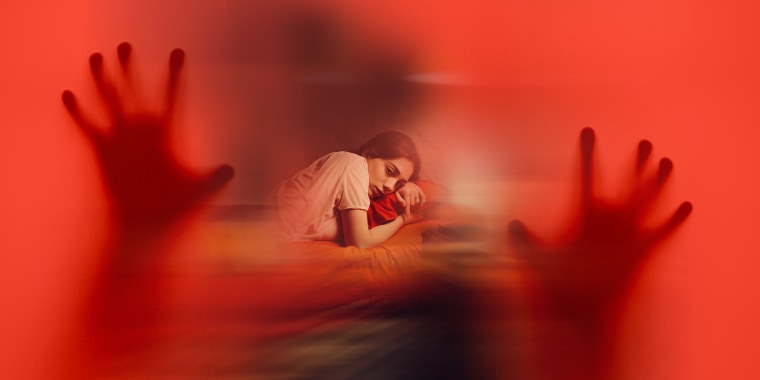Night terrors are a rare, but scary disorder in which people can scream, thrash and cry — without ever waking up.
The person affected may have open eyes and bodily reactions, which may scare nearby loved ones, but probably won't remember the dream state in the morning. TODAY spoke with experts about what happens during night terrors and how to help a loved one who might be suffering.
What are night terrors?
The outbursts, which take place in one of the deepest stages of sleep, can be interchangeably referred to as "night terrors" or "sleep terrors."
"Night terrors are these episodes of screaming, almost feeling like you're awake — your eyes can be awake, your body could be tense, you can have actual heart rate changes, all while you're sleeping," according to clinical psychologist Courtney Bancroft, who specializes in sleep. "But the person who's experiencing this doesn't remember it the next day."
Night terrors differ from nightmares in two key ways: The person affected by night terrors usually doesn't remember what happened to them and they do not wake up from sleep.
Bancroft said that the night terrors end when the person affected falls back into regular sleep patterns.
Night terrors are "an abnormal activation of dreams" that tend to be scarier than regular nightmares, according to Joshua Tal, a psychologist who specializes in sleep disorders.
"They don't actually remember what the dream was, but they feel it in their body," Tal said. "They feel like they went through something, but they don't remember exactly what."
There are other, less common forms of night terrors, including something that is called sleep paralysis, according to Eleanor McGlinchey, PhD, a psychologist who treats sleep difficulties.
"Some other kind of interesting forms that you might see... is this experience where people will report that they are awake, but they can't move," said McGlinchey. "This is a pretty rare experience, but it does happen when you're still in REM sleep. Your brain is still kind of in dream mode, and when you are in that type of sleep, your body is paralyzed."
"Sometimes you can wake up out of that and the experience is very terrifying," he added, "because you can't move for a few moments. It's usually pretty short and people describe that they are seeing leftover images from a dream they are having."

What causes a night terror?
The biggest trigger for a night terror is sleep deprivation, McGlinchey said.
"Just not getting enough sleep or... having irregular bedtimes and going to bed at different bed times might trigger or make it more likely that you'll have one of these night terrors," she explained.
There is also some connection between other mental illnesses or sleep disorders and sleep terrors.
"People that have OCD, anxiety, depression [or] PTSD may have an experience of these night terrors or sleep terrors," Bancroft said. "It also can happen in adults when somebody is extremely stressed or they're maybe having a lot of difficulty with sleep schedule, changes or disruptions to their sleep."
Other conditions, like sleep apnea, can lead to irregular sleep or sleep deprivation, and that may progress to a night terror, according to McGlinchey.

There are some myths that sleep terrors in children occur due to trauma or "bad parenting," but there's no evidence that supports that, she added.
"I have heard things like 'Oh, it means your child isn't securely attached,' but there's really no evidence for any of those things," she said. "Most of the time, it is just not quite getting enough sleep or not having a regular bedtime."
Who is affected by night terrors?
Children are most likely to experience the condition. The "peak age," according to Bancroft, is about 1 and a half years old, around 35 to 40% of children in that age range being affected.
"Kids wake up in the middle of the night screaming, crying, something like that, and they look awake, but they're actually still asleep," said McGlinchey. "It can be very distressing for parents."
When it comes to adults, the rates go down to around 5%.
Different genders also experience sleep terrors differently, with men being more likely to be affected than women, according to Bancroft. There may also be a genetic component.
"There's not too much known about it, but the fact is, they do find, in studies of twins, that identical twins will have a closer instance of this," Bancroft said. "People that have this in their family also may experience it, so there may be a genetic component."
What can be done about them?
All three experts had advice on what can be done to help reduce the effects of night terrors. You can also consult a pediatrician to make sure that there is no larger issue disturbing sleep.
"Usually, the first line of treatment is to have a regular bedtime," said McGlinchey, since sleep terrors can often start with sleep deprivation. However, if that doesn't work, there are more options out there.
McGlinchey also recommends a process called anticipatory awakenings, where a parent or loved one gently wakes the person shortly before they usually have a night terror.

"If you know that the night terror is usually happening, and it usually is that it happens at an earlier part of the night, (around) 10 P.M. for a child, then you can actually slightly wake them a little bit before that," she said. "Coming in, waking them up a little bit, like giving them a hug or something like that in a comforting way, and putting them back to sleep almost like, resets the body's sleep cycle, so that REM experience doesn't come on in a more extreme way. It kind of is used as a reset. Usually just a few days of that can make things better in the long term."
Tal said that psychological treatment is an option, if necessary.
"A psychological treatment for night terrors would look at coping skills in general," he explained. "It would look at the activation in general and increasing the activation of the sympathetic nervous system... It's definitely not a sign of any severe pathology. It's a normal thing that happens to people, that can be scary. If it happens to you, or to someone you love, they will probably grow out of it naturally."
Bancroft said that oftentimes, the terrors will resolve on their own, especially in young children.
"There are a lot of factors that go into it, which leads to the treatment of reducing all of those factors," she said. "Often, you don't need to use any medication to treat it. You wouldn't even treat it, really. Parents are kind of advised that it's not harming the child, they don't even remember... when the night terror's over, they'll continue sleeping peacefully."


